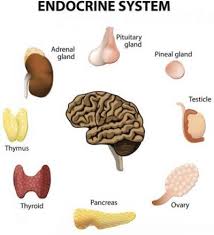
ENDOCRINOLOGY
The endocrine system consists of cells, tissues, and organs that secrete hormones as a primary or secondary function. The endocrine gland is the major player in this system. The primary function of these ductless glands is to secrete their hormones directly into the surrounding fluid.The endocrine system is made up of glands that produce and secrete hormones, chemical substances produced in the body that regulate the activity of cells or organs. These hormones regulate the body's growth, metabolism (the physical and chemical processes of the body), and sexual development and function.
Hormone: A chemical substance produced in the body that controls and regulates the activity of certain cells or organs. Many hormones are secreted by special glands, such as thyroid hormone produced by the thyroid gland.The anterior pituitary (pars distalis) is responsible for the release of hormones that include growth hormone, prolactin, thyroid-stimulating hormone, follicle-stimulating hormone, luteinizing hormone, adrenocorticotropic hormone, and melanocyte-stimulating hormone.The posterior lobe does not produce hormones per se—this is done by nerve cells in the hypothalamus—but it does release them into the circulation. The hormones of the pituitary gland send signals to other endocrine glands to stimulate or inhibit their own hormone production.
There are at least three hormones intimately involved in the regulation of the level of calcium in the blood: parathyroid hormone (PTH), calcitonin and calcitriol (1, 25 dihydroxyvitamin D, the active form of vitamin D).Calcitonin reduces calcium levels in the blood by two main mechanisms: It inhibits the activity of osteoclasts, which are the cells responsible for breaking down bone. When bone is broken down, the calcium contained in the bone is released into the bloodstream.The parathyroids produce a hormone called parathyroid hormone (PTH). PTH raises the blood calcium level by: breaking down the bone (where most of the body's calcium is stored) and causing calcium release. increasing the body's ability to absorb calcium from food.Vitamin D's best-known role is to keep bones healthy by increasing the intestinal absorption of calcium. Without enough vitamin D, the body can only absorb 10% to 15% of dietary calcium, but 30% to 40% absorption is the rule when vitamin reserves are normal
Insulin helps the cells absorb glucose, reducing blood sugar and providing the cells with glucose for energy. When blood sugar levels are too low, the pancreas releases glucagon. Glucagon instructs the liver to release stored glucose, which causes blood sugar to rise.Insulin helps control blood glucose levels by signaling the liver and muscle and fat cells to take in glucose from the blood. Insulin therefore helps cells to take in glucose to be used for energy. If the body has sufficient energy, insulin signals the liver to take up glucose and store it as glycogen.Glucagon's role in the body is to prevent blood glucose levels dropping too low. To do this, it acts on the liver in several ways: It stimulates the conversion of stored glycogen (stored in the liver) to glucose, which can be released into the bloodstream. This process is called glycogenolysis.
Diabetes mellitus (DM), commonly known as diabetes, is a group of metabolic disorders characterized by a high blood sugar level over a prolonged period of time. Symptoms often include frequent urination, increased thirst, and increased hunger. If left untreated, diabetes can cause many complications.
The term diabetes is derived from Latin (originally Greek) and means “to go through or siphon,” referring to a large amount of urine produced by the kidneys. The term mellitus, in Latin, means “sweet.” Diabetes mellitus causes high blood glucose levels and glucose eventually spills into the urine.Diabetes mellitus is a common disease where there is too much sugar (glucose) floating around in your blood. This occurs because either the pancreas can't produce enough insulin or the cells in your body have become resistant to insulin.


